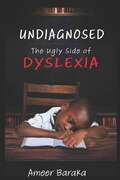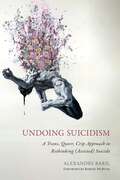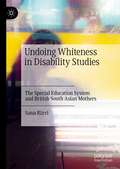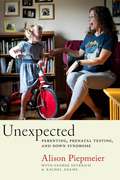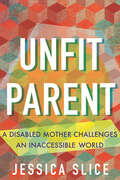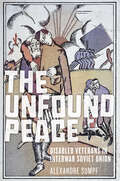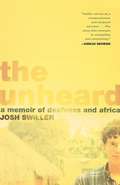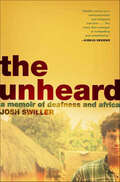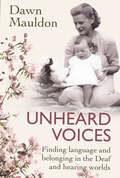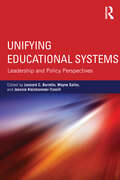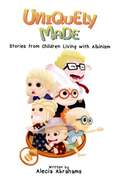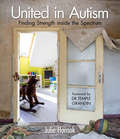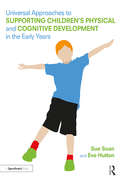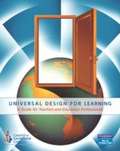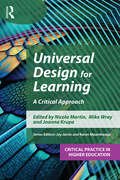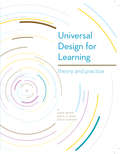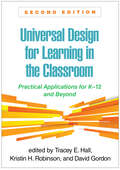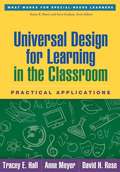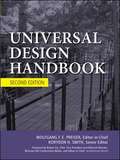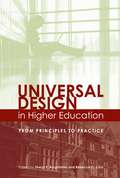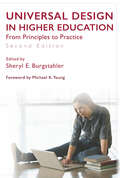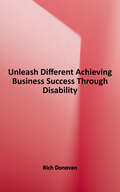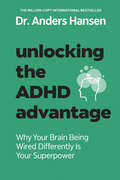- Table View
- List View
Undiagnosed: The Ugly Side of Dyslexia
by Ameer BarakaIn UNDIAGNOSED, The Ugly Side of Dyslexia, Emmy nominated actor Ameer Baraka depicts how coming of age in the murderous streets of 1980s New Orleans collided with an unrecognized learning difference. Incarcerated for manslaughter at the age of fourteen, Ameer must reconcile his past with the will to persevere through the misconception that he's unable to learn. At age twenty-three, Ameer re-enters the prison system, where he reclaims an education denied to so many who struggle to read. His rage transforms into determination to help other inmates and young people recognize that through perseverance and education, there is an alternative to living a life of crime and a method to dismantle the school-to-prison pipeline. Stories speak louder than statistics, and in this tale of redemption, the good we do is measured by what we've overcome and the lives we inspire after discovering our truth. Ameer Baraka is an award-winning and Daytime Emmy Nominated Actor, author, dyslexia advocate, youth mentor, and prison coach. Born to humble beginnings in New Orleans, Ameer's early life was as gloomy and as ill-fated as a young life could have been. In and out of the prison system as a kid for transgressions ranging from youthful indiscretions to major crimes, he was seemingly on a one-way trip to oblivion. Almost illiterate when he went to prison, he was diagnosed with dyslexia and learned to read in his mid-twenties while behind bars. Seeing how education and ability to read have changed his life, Ameer is dedicated to inspiring young people with his message that they, too, can overcome meager beginnings and obstacles in their way to eventually triumph through hard work, dedication, strong faith, and the pursuit of education.
Undoing Suicidism: A Trans, Queer, Crip Approach to Rethinking (Assisted) Suicide
by Alexandre BarilIn Undoing Suicidism, Alexandre Baril argues that suicidal people are oppressed by what he calls structural suicidism, a hidden oppression that, until now, has been unnamed and under-theorized. Each year, suicidism and its preventionist script and strategies reproduce violence and cause additional harm and death among suicidal people through forms of criminalization, incarceration, discrimination, stigmatization, and pathologization. This is particularly true for marginalized groups experiencing multiple oppressions, including queer, trans, disabled, or Mad people. Undoing Suicidism questions the belief that the best way to help suicidal people is through the logic of prevention. Alexandre Baril presents the thought-provoking argument that supporting assisted suicide for suicidal people could better prevent unnecessary deaths. Offering a new queercrip model of (assisted) suicide, he invites us to imagine what could happen if we started thinking about (assisted) suicide from an anti-suicidist and intersectional framework. Baril provides a radical reconceptualization of (assisted) suicide and invaluable reflections for academics, activists, practitioners, and policymakers.
Undoing Whiteness in Disability Studies: The Special Education System and British South Asian Mothers
by Sana RizviThis book offers a nuanced way to conceptualise South Asian Muslim families’ experiences of disability within the UK. The book adopts an intersectional lens to engage with personal narratives on mothering disabled children, negotiating home-school relationships, and developing familiarity with the complex special education system. The author calls for a re-envisioning of special education and disability studies literature from its currently overwhelmingly White middle-class discourse, to one that espouses multi-ethnic and multi-faith perspectives. The book positions minoritised mothers at the forefront of the home-school relationship, who navigate the UK special education system amidst intersecting social inequalities. The author proposes that schools and both formal and informal institutions reformulate their roles in facilitating true inclusion for minoritised disabled families at an epistemic and systemic level.
Unexpected: Parenting, Prenatal Testing, and Down Syndrome
by Alison PiepmeierWhat prenatal tests and down syndrome reveal about our reproductive choicesWhen Alison Piepmeier—scholar of feminism and disability studies, and mother of Maybelle, an eight-year-old girl with Down syndrome—died of cancer in August 2016, she left behind an important unfinished manuscript about motherhood, prenatal testing, and disability. In Unexpected, George Estreich and Rachel Adams pick up where she left off, honoring the important research of their friend and colleague, as well as adding new perspectives to her work.Based on interviews with parents of children with Down syndrome, as well as women who terminated their pregnancies because their fetus was identified as having the condition, Unexpected paints an intimate, nuanced picture of reproductive choice in today’s world. Piepmeier takes us inside her own daughter’s life, showing how Down syndrome is misunderstood, stigmatized, and condemned, particularly in the context of prenatal testing.At a time when medical technology is rapidly advancing, Unexpected provides a much-needed perspective on our complex, and frequently troubling, understanding of Down syndrome.
Unfit Parent: A Disabled Mother Challenges an Inaccessible World
by Jessica Slice&“A glorious, revelatory book.&”—Ed Yong, Pulitzer Prize–winning journalist and author of An Immense World&“A beautiful, transformative book about being a parent in a world that rejects frailty and weakness.&”—Rachel Aviv, staff writer at the New YorkerA paradigm shifting look at the landscape of disabled parenting—the joys, stigma, and discrimination—and how disability culture holds the key to transforming the way we all raise our kidsJessica Slice&’s disability is exactly what her child needed as a newborn. After becoming disabled a handful of years prior from a shift in her autonomic nervous system, Jessica had done the hard work of disentangling her worth from productivity and learning how to prepare for an unpredictable and fragile world. Despite evidence to the contrary, nondisabled people and systems often worry that disabled people cannot keep kids safe and cared for, labeling disabled parents &“unfit,&” but disabled parents and culture provide valuable lessons for rejecting societal rules that encourage perfectionism and lead to isolation.Blending her experience of becoming disabled in adulthood and later becoming a parent with interviews, social research, and disability studies, Slice describes what the landscape is like for disabled parents. From expensive or non-existent adaptive equipment to inaccessible healthcare and schools to the terror of parenting while disabled in public and threat of child protective services, Slice uncovers how disabled parents, out of necessity, must reject the rules and unrealistic expectations that all parents face. She writes about how disabled parents are often more prepared than nondisabled parents to navigate the uncertainty of losing control over bodily autonomy. In doing so, she highlights the joy, creativity, and radical acceptance that comes with being a disabled parent.While disabled parents have been omitted from mainstream parenting conversations, Slice argues that disabled bodies and minds give us the hopeful perspectives and solutions we need for transforming a societal system that has left parents exhausted, stuck, and alone.
The Unfound Peace: Disabled Veterans in Interwar Soviet Union (NIU Series in Slavic, East European, and Eurasian Studies)
by Alexandre SumpfThe Unfound Peace is the first book dealing with disabled former servicemen of tsarist Russia in all regards—socioeconomic status, healthcare, social reintegration into families and communities, self-representation—and the only one comparing World War I and Russian Civil War veterans. Alexandre Sumpf considers the ways disabled Great War veterans tried to live under the Bolsheviks and compares their experiences with those of the Red Army veterans who received special considerations from the new regime. Offering a history of the body and health in relation to work, The Unfound Peace also compares the situation of disabled veterans with that of disabled workers who were subject to the same demands of extreme productivity but benefited from better social protection, though they dealt with accusations that they were faking their disabilities. Sumpf's exploration of disabled veterans, with transnational comparisons, offers the possibility of rereading the history of the first generation of Soviets through the collective and private memory of war, in the USSR and in exile.
The Unheard: A Memoir of Deafness and Africa
by Josh SwillerSwiller spent his early years in frustrated limbo on the sidelines of the hearing world. So he decided to abandon the well-trodden path after college, setting out to find a place so far removed that his deafness would become irrelevant.
The Unheard: A Memoir of Deafness and Africa
by Josh SwillerA young man's quest to reconcile his deafness in an unforgiving world leads to a remarkable sojourn in a remote African village that pulsates with beauty and violence These are hearing aids. They take the sounds of the world and amplify them." Josh Swiller recited this speech to himself on the day he arrived in Mununga, a dusty village on the shores of Lake Mweru. Deaf since a young age, Swiller spent his formative years in frustrated limbo on the sidelines of the hearing world, encouraged by his family to use lipreading and the strident approximations of hearing aids to blend in. It didn't work. So he decided to ditch the well-trodden path after college, setting out to find a place so far removed that his deafness would become irrelevant.That place turned out to be Zambia, where Swiller worked as a Peace Corps volunteer for two years. There he would encounter a world where violence, disease, and poverty were the mundane facts of life. But despite the culture shock, Swiller finally commanded attention—everyone always listened carefully to the white man, even if they didn't always follow his instruction. Spending his days working in the health clinic with Augustine Jere, a chubby, world-weary chess aficionado and a steadfast friend, Swiller had finally found, he believed, a place where his deafness didn't interfere, a place he could call home. Until, that is, a nightmarish incident blasted away his newfound convictions.At once a poignant account of friendship through adversity, a hilarious comedy of errors, and a gripping narrative of escalating violence, The Unheard is an unforgettable story from a noteworthy new talent.
Unheard Voices: Finding language and belonging in the Deaf and hearing worlds
by Dawn MauldonIn this poignant and powerful memoir, the author tells the story of their childhood growing up with Deaf parents. Through intimate and evocative prose, Dawn explores the challenges and joys of living in a world that is often hostile and unwelcoming to those who are different.From the isolation and challenges that come with being a child of Deaf parents, to the strength and resilience that comes with love and belonging, the author shares their unique and deeply personal perspective on what it means to see and communicate in a richly silent world.This book is a must-read for anyone interested in the Deaf experience, and the power of love and belonging to overcome adversity. Beautifully written and deeply moving, Unheard Voices is an exploration of what it means to be a part of a diverse and vibrant culture.
Unifying Educational Systems: Leadership and Policy Perspectives
by Wayne Sailor Leonard C. Burrello Jeannie Kleinhammer-TramillUnifying Educational Systems encourages leaders to move beyond the traditional forms and rituals of leadership for special education that are caught within traditional definitions of a continuum of services. Grounded in public policy debates, research on teaching and learning, and an emerging consensus throughout the leadership community that calls into question our current practices, chapters in this volume provide a discussion of the purpose, principles, and paradoxes extant in the implementation of current special education policy. Chapter authors discuss how students are currently served, the feasibility of re-conceptualizing special education leadership in the current policy context, and the challenges for the future. Ultimately, Unifying Educational Systems calls for a new policy framework to integrate special education within the larger instructional support system in schools, in order to support a social justice and inclusive practices agenda.
Uniquely Made: Stories from Children Living with Albinism
by Alecia AbrahamsThe book, "Uniquely Made: Stories from Children Living with Albinism" by Alecia Abrahams, explores the lives and experiences of children with albinism across different cultural and geographical contexts. It highlights the challenges they face, the discrimination they encounter, and the unique aspects of their condition while delivering inspiring messages about resilience, self-acceptance, and kindness.
United in Autism: Finding Strength inside the Spectrum
by Julie HornokParents of children with autism across the globe share stories of their experiences of life on the spectrum for those parents just beginning their journey. A diagnosis of autism can rock a family&’s world. The toll it takes on everyone involved can be one of isolation; a child who doesn&’t respond to the world around them, a parent who gives dedication, patience and love often with no expressible love given back. It&’s a messy equation with huge emotional and financial costs. As a mother of a daughter with autism, Julie Hornok has experienced her fair share of these parenting challenges, and now brings together thirty inspiring and heartfelt stories from parents raising children from all places on the spectrum and from all corners of the world. These mothers and fathers have experienced some of the worst of what this disorder can do, but in seeking help, they found it...and more. Now they pay it forward by sharing their accounts and giving back to the autism community. United in Autism: Finding Strength inside the Spectrum offers understanding, comfort, and hope as well as global allies and strength to those who feel alone.Mom&’s Choice Award GOLD Award-Winning TitleWith a foreword by Dr. Temple GrandinPraise for United in Autism&“This book offers both lessons and hope . . . Well-written and reassuring.&” —Kirkus Reviews&“Those in search of stories of solidarity will find that and more here.&” —Library Journal
Universal Approaches to Support Children’s Physical and Cognitive Development in the Early Years
by Sue Soan Eve HuttonThis book has been designed to provide educators with practical strategies and approaches to support the motor and coordination development of children within an educational setting. Difficulties with movement and coordination can significantly affect participation and learning, in Early Years settings and schools, but many of these children can be supported through changes to their educational environment, or the implementation of universal strategies. This invaluable resource demonstrates how professionals can positively impact on children’s educational progress, outcomes and social participation. This book: Combines perspectives of occupational therapy and special educational needs, using evidence-based research to provide professionals with the knowledge and confidence to enhance quality first teaching skills for all children, in all settings. Promotes inclusion and participation in activities that affect pupil progress, such as handwriting, self-care, lunchtime, physical activities and play. Offers a range of activities, tips and guidance to help improve progress and academic achievement for all children. Taking a holistic approach to early learning and teaching, this is a vital resource for teachers and trainee teachers, teaching assistants, SENCOs, student occupational therapists and all practitioners working in Early Years settings.
Universal Design for Learning: A Guide for Teachers and Education Professionals
by Council for Exceptional ChildrenUniversal Design for Learning: A Guide for Teachers and Education Professionals is written for instructors in education classes as a means of informing current and future teachers about the basics of universal design for learning (UDL) and the ways it can be implemented in schools and classrooms. The information in this text serves as a guide introducing the concept of universal design for learning to educators preparing to teach and those currently instructing students with disabilities.
Universal Design for Learning: A Critical Approach (Critical Practice in Higher Education)
by Nicola Martin Mike Wray Joanna KrupaCritical Practice in Higher Education provides a scholarly and practical entry point for academics into key areas of higher education practice. Each book in the series explores an individual topic in depth, providing an overview in relation to current thinking and practice, informed by recent research. The series will be of interest to those engaged in the study of higher education, those involved in leading learning and teaching or working in academic development, and individuals seeking to explore particular topics of professional interest.This essential text focuses on the principles of Universal Design for Learning (UDL) and how they should underpin thinking in embedding inclusive practice. The Covid-19 pandemic meant the higher education sector had to rethink curriculum delivery and now has the opportunity to build on this momentum towards full UDL. The book translates the principles of UDL into research-informed inclusive practice, looking at UDL from the perspectives of various marginalised groups, including but not limited to categories protected by the Equality Act 2010. Curriculum content and delivery is considered as well as factors such as digital poverty. Readers are invited to consider a more nuanced understanding of teaching and learning which celebrates and accommodates diversity.
Universal Design for Learning: Theory and Practice
by David Rose Anne Meyer David GordonIn the 1990s, Anne Meyer, David Rose, and their colleagues at CAST introduced universal design for learning (UDL), a framework to improve teaching and learning. Universal Design for Learning: Theory & Practice includes: • New insights from research on learner differences and how human variability plays out in learning environments • Research-based discussions of what it means to become expert at learning • First-hand accounts and exemplars of how to implement UDL at all levels and across subjects using the UDL Guidelines • "Dig Deeper" segments that enrich the main content • Dozens of original illustrations and access to videos and other online features at http://udltheorypractice.cast.org • Opportunities to participate in a UDL community
Universal Design for Learning in the Classroom: Practical Applications for K-12 and Beyond
by Tracey E. Hall Kristin H. Robinson David GordonThe Universal Design for Learning (UDL) framework has grown from its origins in special education to being widely used to support all students, making the fully rewritten second edition of this indispensable guide more relevant than ever. Filled with practical, vivid examples and tips, the book demonstrates the power of UDL when applied to particular content areas. Specific teaching ideas are presented for literacy, STEM, project-based learning, career and technical education, and the arts. The editors and contributors describe practical ways to create thriving learning environments that use UDL to meet diverse learners' needs. New to This Edition *Entirely new content. *Coverage expanded from elementary and middle grades to secondary and beyond. *Innovative approaches embracing the growth of UDL and the ubiquity of digital technologies in today&’s classrooms. *Spotlight on issues of equity and inclusion. *Chapters on antiracism, social–emotional learning, career and technical education, journey mapping, and curriculum design. *Compelling discussions of advances in UDL principles and research directions.
Universal Design for Learning in the Classroom
by Anne Meyer Tracey HallClearly written and well organized, this book shows how to apply the principles of universal design for learning (UDL) across all subject areas and grade levels. The editors and contributors describe practical ways to develop classroom goals, assessments, materials, and methods that use UDL to meet the needs of all learners. Specific teaching ideas are presented for reading, writing, science, mathematics, history, and the arts, including detailed examples and troubleshooting tips. Particular attention is given to how UDL can inform effective, innovative uses of technology in the inclusive classroom.
Universal Design Handbook (2nd edition)
by Wolfgang Preiser Korydon H. SmithThe Latest Advances in Universal Design. Thoroughly updated and packed with examples of global standards and design solutions, Universal Design Handbook, Second Edition, covers the full scope of universal design, discussing how to develop media, products, buildings, and infrastructure for the widest range of human needs, preferences, and functioning. This pioneering work brings together a rich variety of expertise from around the world to discuss the extraordinary growth and changes in the universal design movement. The book provides an overview of universal design premises and perspectives, and performance-based design criteria and guidelines. Public and private spaces, products, and technologies are covered, and current and emerging research and teaching are explored. This unique resource includes analyses of historical and contemporary universal design issues from seven different countries, as well as a look at future trends. Students, advocates, policy makers, and design practitioners will get a theoretical grounding in and practical reference on the physical and social roles of design from this definitive volume. UNIVERSAL DESIGN HANDBOOK, SECOND EDITION, COVERS: United Nations Convention on the Rights of Persons with Disabilities; U. S. accessibility codes and standards, including the Americans with Disabilities Act (ADA); Life safety standards and guidelines; Universal design implementations in Norway, Japan, France, Germany, Brazil, Italy and the Old City of Jerusalem; Planning ADA implementation in public educational institutions; Urban scale and mass transportation universal design; Designing inclusive experiences, including outdoor play settings; Office and workspace design; Universal design in home building and remodeling; Products and technologies, including autos, web access, media, and digital content; Universal design research initiatives, education, and performance assessments.
Universal Design in Higher Education: From Principles to Practice
by Rebecca Cory Sheryl BurgstahlerUniversal design (UD) has a rich history in applications to commercial products and architecture and is now being applied to instruction and student services. UD holds promise for making educational products and environments more inclusive of all students, faculty, staff, and visitors. This chapter is an overview of topics covered in this book, including the definition and principles of UD, the process of UD, and applications of UD in higher education (UDHE).
Universal Design in Higher Education, Second Edition: From Principles to Practice
by Sheryl E. BurgstahlerThis second edition of the classic Universal Design in Higher Education is a comprehensive, up-to-the-minute guide for creating fully accessible college and university programs. The second edition has been thoroughly revised and expanded, and it addresses major recent changes in universities and colleges, the law, and technology. As larger numbers of people with disabilities attend postsecondary educational institutions, there have been comparable greater efforts to make the full array of classes, services, and programs accessible to all students. This revised edition provides both a full survey of those measures and practical guidance for schools as they work to turn the goal of universal accessibility into a reality. As such, it makes an indispensable contribution to the growing body of literature on special education and universal design. This book will be of particular value to university and college administrators, and to special education researchers, teachers, and activists.
University of Courage: A History of the Hadley School for the Blind
by Donald Wing HathawayA warmly written history by a man who loved his subject and his work with Hadley. "And so as we reach the end of our story, we find ourselves dreaming--as William Allen Hadley once dreamed--of life made more abundant through knowledge, and of hope made reality through perseverance. How strangely life can exceed the boldest dream! Could William Hadley possibly have conceived that his University of Courage would one day reach out to blind persons all over the earth in a true universality of courage, within a world of work in which all may share? Can we today set limits on horizons that only continue to expand?
Unleash Different: Achieving Success Through Disability
by Rich DonovanThere are 1.3 billion people around the world who identify as having a disability. When you include friends and family, the disability market touches 53% of all consumers. It is the world's largest emerging market. Unleash Different illustrates how companies like Google, PepsiCo, and Nordstrom are attracting people with disabilities as customers and as employees. Replacing 'nice to do' with 'return on investment' allows market forces to take over and the world's leading brands to do what they do best: serve a market segment - in this case, the disability market.
Unlocking the ADHD Advantage: Why Your Brain Being Wired Differently Is Your Superpower
by Anders Hansen&“Anders Hansen&’s work is the antidote to our modern-day struggles.&”—Dr. Rangan Chatterjee, author of The Stress Solution Learn to accept and harness your ADHD traits for a happier and more productive life—from one of the world&’s leading psychiatristsDo you have trouble sitting still, staying patient, or maintaining concentration? You might be surprised to learn that these traits, commonly associated with ADHD, were once crucial evolutionary advantages, potentially shaping our species&’ survival. In Unlocking the ADHD Advantage, Dr. Anders Hansen, a bestselling author and psychiatrist, delves into the role these traits may have played in our ancestors&’ ability to thrive and how these traits can powerful tools in modern life. Understand and embrace the diagnosis: Learn about the &“ADHD scale,&” the common challenges,the often-unsung advantages, and why diagnoses are rising. Discover strategies for success: With Dr. Hansen&’s holistic approach, explore practical strategies to help you harness even the most challenging of these traits and learn to enhance your focus, manage impulsivity, and tap into your innate creativity. Be empowered by personal stories: Inspiring stories from individuals who have learned to utilize their ADHD traits and achieved remarkable success will motivate and inspire you on your own unique journey.
Unlocking the Potential of Women with Disabilities in the Digital Era
by Jalasa Sapkota"Unlocking the Potential of Women with Disabilities in the Digital Era" is a compelling collection of articles written by Jalasa Sapkota, an inclusive digital rights activist and dedicated researcher. With a focus on women with disabilities, the book delves into the importance of digital accessibility and inclusion, comprehensive sexual education, inclusive reproductive health, gender equity, autonomy, and regional networking. The book begins by exploring the challenges faced by women with disabilities in Nepal in terms of disability and digital inclusion. Sapkota emphasizes the need for overcoming these barriers to create a more inclusive society. She highlights the significance of making digital platforms accessible for all individuals, regardless of their disabilities, ensuring equal opportunities and empowerment. In subsequent chapters, Sapkota delves into the realm of reproductive health services for women with disabilities, both in physical and digital spaces. She advocates for the enhancement of accessibility and empowerment, shedding light on the importance of inclusive approaches in addressing the unique needs and rights of these women. Additionally, she discusses the revolutionizing role of comprehensive sexual education, empowering women with disabilities through accessible and inclusive offline and online approaches. The book also addresses the challenges and recommendations for gender equity for women with disabilities in Nepal. Sapkota examines the existing obstacles and advocates for the removal of barriers, promoting a more equitable society. Furthermore, she highlights the importance of autonomy for individuals with disabilities, challenging the stigma associated with disability and supporting independent living. Lastly, the book emphasizes the significance of regional networking among people with disabilities in South Asia. Sapkota explores practical ways to establish connections and foster collaboration, ultimately working towards the betterment of the disabled community as a whole. Through her research and personal experiences, Jalasa Sapkota presents a thought-provoking and informative collection that aims to inspire change, raise awareness, and promote inclusivity for women with disabilities. The book is a valuable resource for policymakers, activists, researchers, and anyone interested in the intersection of disability, digital inclusion, and women's empowerment.
